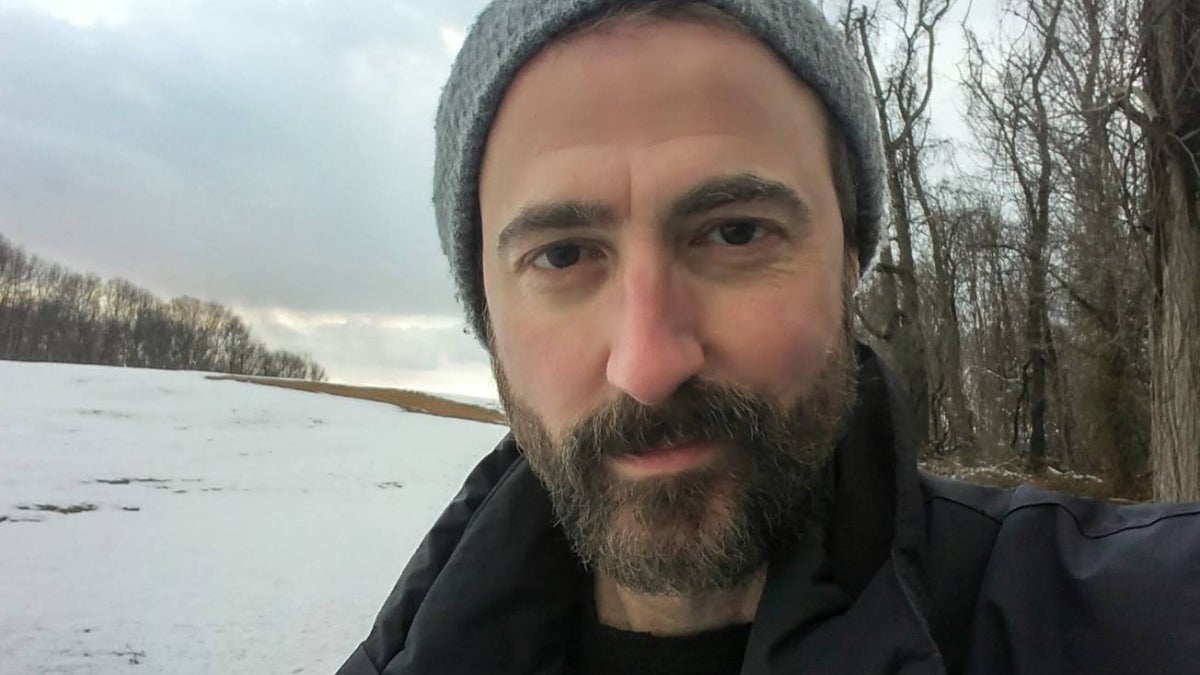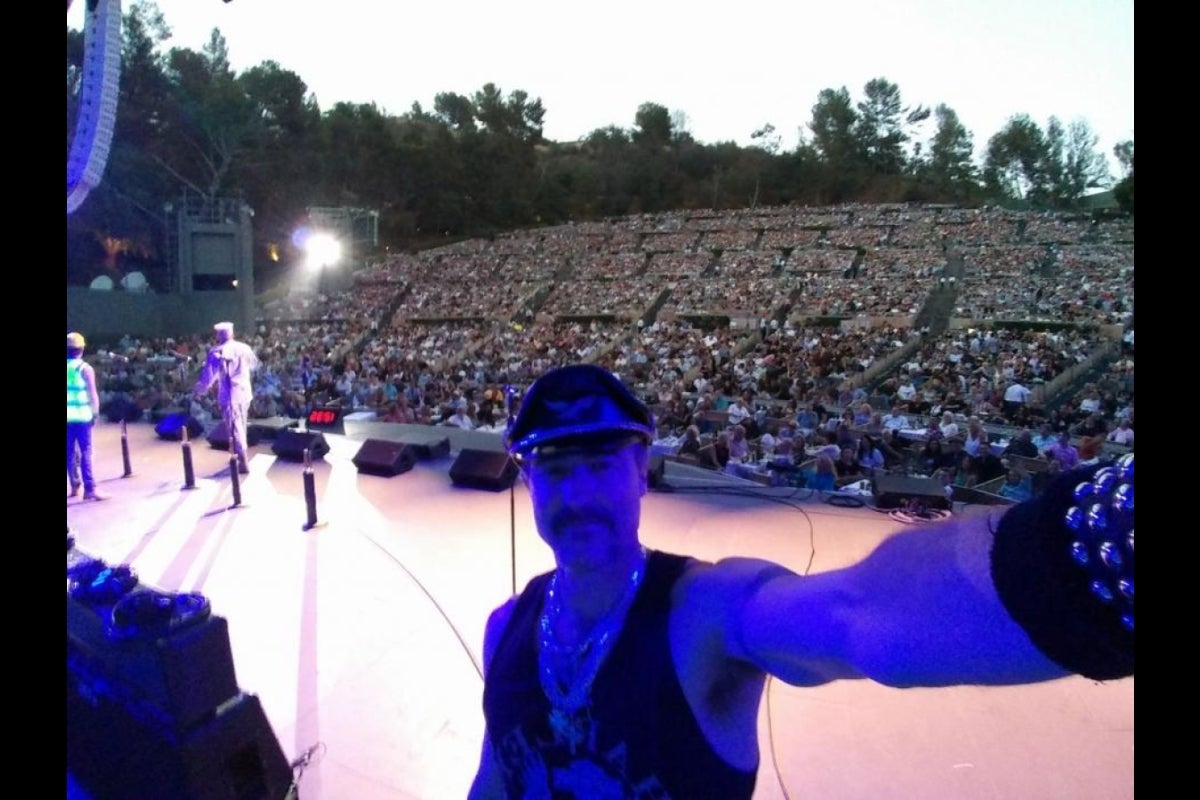It takes a Village Person: Member of iconic band earns ASU master’s degree

“Though I’ve experienced a lot of cool stuff in my career and personal life during my 53 years on this spinning rock," Eric Anzalone said, “my greatest accomplishment (besides my daughter) is getting my master’s degree in American media and popular culture from Arizona State University.” Courtesy photo
Editor’s note: This is part of a series of profiles for fall 2018 commencement. Read about more graduates.
“Being a leather-clad, mustachioed, disco icon should never define a person!” joked graduating film and media studies student Eric Anzalone.
But “macho man” Anzalone is actually only sort of kidding. This singer-actor-producer from New Jersey replaced Glenn Hughes as the Biker/Leatherman in the campy disco Village People band. Anzalone’s stint touring the world with the group from 1995 until 2017, did, in fact define several decades of his life.
Now he’s ready for a chance to define himself as a scholar and as a teacher. You might say Anzalone wants to be known for his brains and not his … well, leather.
“Though I’ve experienced a lot of cool stuff in my career and personal life during my 53 years on this spinning rock,” said Anzalone, “my greatest accomplishment (besides my daughter) is getting my master’s degree in American media and popular culture from Arizona State University.”
In this interview with ASU Now, Anzalone discussed his life’s meandering path, his Star Wars geek status, and why he chose ASU Online as a home-away-from-home.
Question: What was your “aha” moment, when you realized you wanted to study in your field?
Answer: First a little backstory. Having worked in the entertainment industry since 1988, including being a member of a high-profile band since 1995, the majority of my life has involved media. In 2009, I decided to go back and get the bachelor’s degree I never finished in the '80s — I was a theatre major/music minor at the University of Miami. Because I travel over 100,000 miles a year with the band, my only choice was online, and the film and media studies program at ASU was a perfect fit. I graduated in 2012 with a BA in Film and Media Studies ... I was 46 years old!
Now, to the “aha” moment, when I realized I wanted to go back for more. In December 2015, I was sitting in a crowded movie theater, munching on popcorn and enjoying “The Force Awakens” — I have been a Star Wars geek my whole life, I was 12 years old when the first film was released. As excited as I was to be watching another Star Wars film, I couldn’t help but make comparisons to the original film (now known as “A New Hope.”) But, stopping to wipe my greasy-fake-butter-slathered fingers on a tattered napkin, I noticed I wasn’t just making comparisons. I was also analyzing the film using mise-en-scène and race and gender representation, and forming arguments in my head! Though I had promised myself in 2012 after graduating with my BA that I’d never have to do homework again, I had this irresistible urge to learn more, to be a part of the discussion, to share my observations and listen to others who were as excited about film and media as I was. Right then, I knew I had to get my graduate degree.
There are no accidents in life, only collisions ... including “aha” moments, which, with hindsight, inevitably highlight the synchronicity of life. My final applied project for my master’s degree was to help build a new comprehensive Star Wars class for the ASU film and media studies program. I was having a difficult time coming up with appropriate ideas for my applied project and, instead, was just considering taking a comprehensive exam to fulfill the requirement. My committee chair, Kevin Sandler, asked me if I would be interested in building quiz banks for a new Star Wars course as my applied project. I had no idea the film and media studies program was putting together a Star Wars course! My “aha” moment had come full-circle.
Q: What’s something you learned while at ASU — in the classroom or otherwise — that surprised you or changed your perspective?
A: In 2009, after my first film and media studies class on race and gender (with Daniel Bernardi), I was hooked. It was like my eyes were opening for the first time. I know that sounds dramatic, but it’s amazing how conditioned by media and dominant ideology we’ve all become … and when that light switch gets turned on, there’s no looking back. I can honestly say, from my first race and gender class in 2009 through my last class in 2018 (FMS 503: Business in Hollywood), ASU has given me perspective that, arguably, anyone living in the 21st century needs: Every day, each of us processes a constant stream of media, including the content being spoon-fed to us by the “phones” in our pockets. When it comes to film and media studies, ASU is exemplary.
Q: Why did you choose ASU?
A: Originally, because the university offered the online bachelor’s degree program I was looking for. When I decided to get my graduate degree, it was a no-brainer. ASU has, hands-down, one of the best film and media studies programs in the country.
Q: Which professor taught you the most important lesson while at ASU?
A: Kevin Sandler, whom I had as a professor for both undergraduate and graduate film and media studies. When I went back to get my bachelor’s degree in 2009, I was in my mid-40s and had been an industry professional for over two decades, including owning my own production company. Needless to say, I was confident in my ability to analyze, research and write. Even so, Professor Sandler always pushed me to take that extra step, especially in graduate school, to dig deeper, to write more effectively, to make my arguments stronger — an invaluable lesson which can be applied across-the-board in life.
Q: What’s the best piece of advice you’d give to those still in school?
A: Do not give up! During both my undergraduate and graduate studies, I spent many a panicked night trying to piece together a paper or an assignment — notes, Post-its, readings, ideas and index cards everywhere. I can even think of at least one occasion when the stress was so overwhelming I cried! If this ever happens to you, remind yourself you didn’t make it this far by accident ... stay focused, eyes on the prize.
Q: What was your favorite spot on campus, whether for studying, meeting friends or just thinking about life?
A: Though I’m an online student, I’ve visited the campus a few times since 2009. Each time, at some point, I end up taking it all in and chilling at Hayden Lawn.
Q: What are your plans after graduation?
A: After spending decades on the road, I am really looking forward to settling down and teaching film and media. That said, I do continue to tour and will always be creatively involved in production — it’s just who I am — but there is something about sharing my knowledge and experiences with others, especially younger generations. I never wanted to be a teacher ... funny how that happens!
Q: If someone gave you $40 million to solve one problem on our planet, what would you tackle?
A: The biggest problem facing our planet is global warming, but the solution, for the most part, comes without a dollar sign. The solution to global warming is about choices. If I were given $40 million to tackle a problem that could be solved with money, it would be hunger. Approximately one in eight people on this planet suffer from hunger and malnutrition, and the majority of those people don't live in developing countries — some studies have shown that one in seven Americans go to bed hungry! Although $40 million wouldn’t even come close to “solving” world hunger, it is an investment worth making.
More Arts, humanities and education

ASU's Pen Project helps unlock writing talent for inmates
It’s a typical Monday afternoon and Lance Graham is on his way to the Arizona State Prison in Goodyear.It’s a familiar scene.…

Phoenix civil rights activists highlighted in ASU professor’s latest book
As Phoenix began to grow following WWII, residents from other parts of the country moving to the area often brought with them Jim…

Happy mistake: Computer error brings ASU Online, on-campus students together to break new ground in research
Every Thursday, a large group of students gathers in the Teotihuacan Research Laboratory (TeoLab) in the basement of the…


